Operation Delivery and Strategic Commissioning in UK Healthcare
Write a 2000-word assignment, individual reflective log of 1000 words, and a development plan of 500 words on strategic management, procurement and commissioning of services in the health and social care sector.
21 Pages5376 Words50 Views
Added on 2023-04-23
About This Document
This essay provides critical evaluation of the resource implication, proper framework planning, and management of health services in the UK. It also discusses the roles of strategic management in NHS, models and frameworks influencing the procurement and commissioning of services, and international and national practice and policy regarding effective commissioning.
Operation Delivery and Strategic Commissioning in UK Healthcare
Write a 2000-word assignment, individual reflective log of 1000 words, and a development plan of 500 words on strategic management, procurement and commissioning of services in the health and social care sector.
Added on 2023-04-23
ShareRelated Documents
Operation Delivery and Strategic Commissioning 1
OPERATION DELIVERY AND STRATEGIC COMMISSIONING
By (Name)
Class
Professor
College
City and State
OPERATION DELIVERY AND STRATEGIC COMMISSIONING
By (Name)
Class
Professor
College
City and State
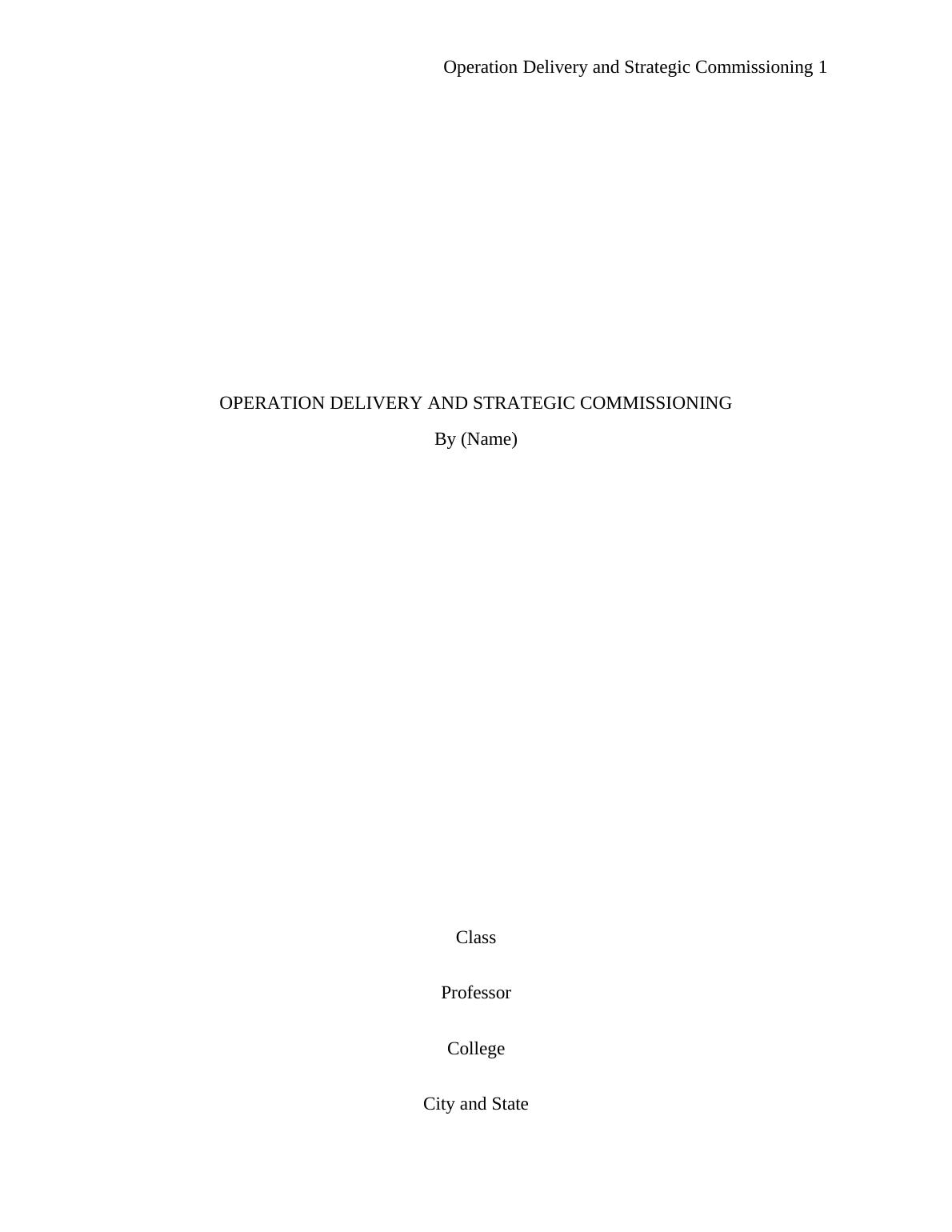
Operation Delivery and Strategic Commissioning 2
Introduction
A vital commentary on strategic social and health care is determined by proper
management, leadership, and effective adaptation to change (Willcocks, 2011, p.23). As such,
the structure of health care services in the UK reflects active growth after the Second World
War. The three primary contributors to this growth are having State-owned medical facilities, a
national network comprising of medical practitioners and community, and providing adequate
health services. Thus, the health care sector in the UK is centralized, though the management of
the various services is separate. From the NHS history, there these functions division between
different statutory organizations creates problems in coordinated and comprehensive service
provision. It is vital to note that the health care sector in the UK is centralized because there was
a need to manage the changing trends in illness and health effectively, the essence of disease
prevention, the need for hospitals and GPs to closely work together, and the need to provide
adequate care of old people (Healthknowledge, n.d). Unfortunately, the social and health care
system in the UK faces various challenges, which may include demographic issues; this is
because of the increase in the aging population and people who suffer from severe disabilities.
Additionally, the continuous revolution in medical technology that is meant to transform the
ability of NHS to cure, prevent, and manage illnesses. Therefore, this essay aims at providing
critical evaluation of the resource implication, proper framework planning, and management of
health services in the UK.
Strategic Management of Delivering Health Services in the UK
The healthcare sector in the UK has increased due to effective planning, appropriate
innovations, and adaptation to changes in health care services. As such, the leaders and managers
responsible for enhancing care quality, and providing operational efficiencies. It is worth noting
Introduction
A vital commentary on strategic social and health care is determined by proper
management, leadership, and effective adaptation to change (Willcocks, 2011, p.23). As such,
the structure of health care services in the UK reflects active growth after the Second World
War. The three primary contributors to this growth are having State-owned medical facilities, a
national network comprising of medical practitioners and community, and providing adequate
health services. Thus, the health care sector in the UK is centralized, though the management of
the various services is separate. From the NHS history, there these functions division between
different statutory organizations creates problems in coordinated and comprehensive service
provision. It is vital to note that the health care sector in the UK is centralized because there was
a need to manage the changing trends in illness and health effectively, the essence of disease
prevention, the need for hospitals and GPs to closely work together, and the need to provide
adequate care of old people (Healthknowledge, n.d). Unfortunately, the social and health care
system in the UK faces various challenges, which may include demographic issues; this is
because of the increase in the aging population and people who suffer from severe disabilities.
Additionally, the continuous revolution in medical technology that is meant to transform the
ability of NHS to cure, prevent, and manage illnesses. Therefore, this essay aims at providing
critical evaluation of the resource implication, proper framework planning, and management of
health services in the UK.
Strategic Management of Delivering Health Services in the UK
The healthcare sector in the UK has increased due to effective planning, appropriate
innovations, and adaptation to changes in health care services. As such, the leaders and managers
responsible for enhancing care quality, and providing operational efficiencies. It is worth noting
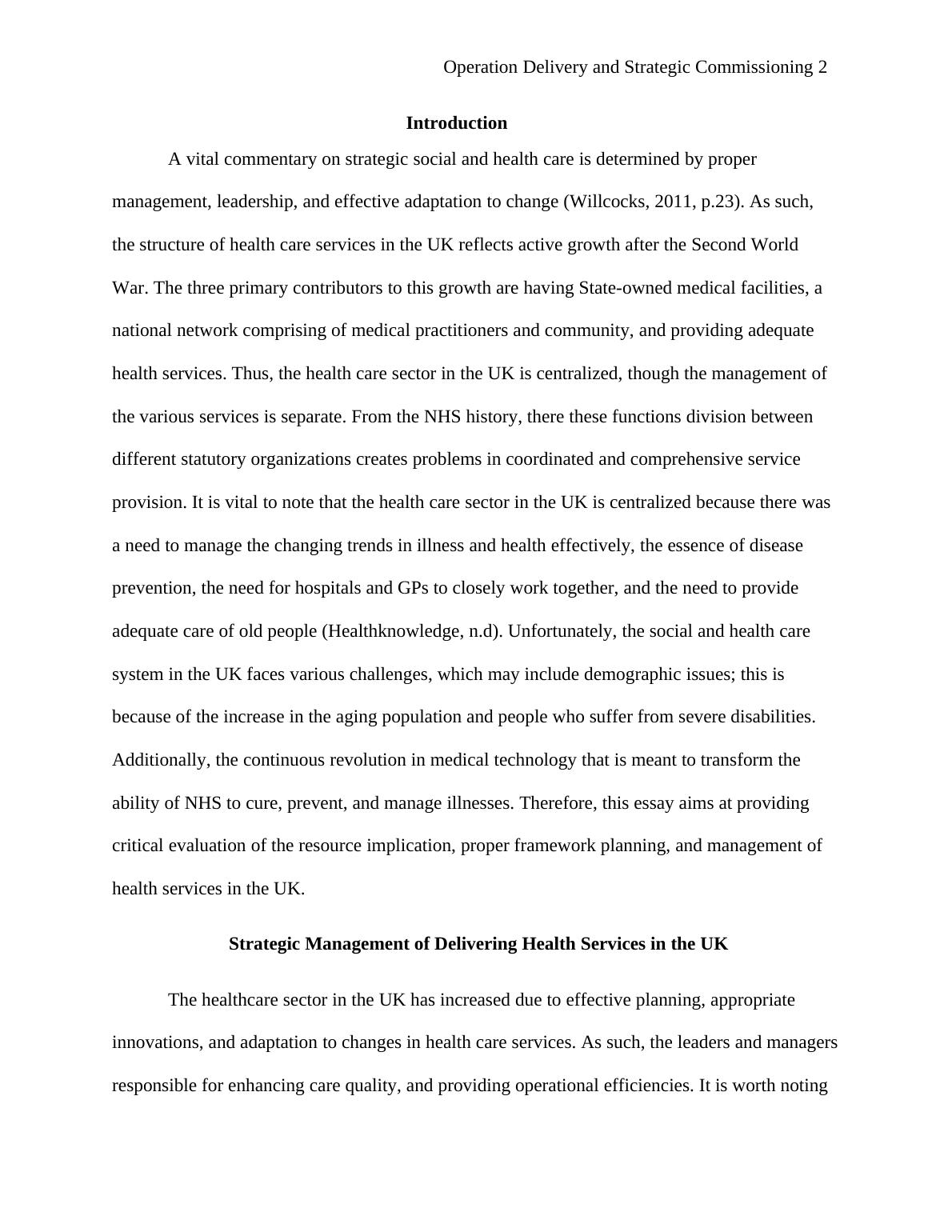
Operation Delivery and Strategic Commissioning 3
that the continuous increase in the public and cost expectations have resulted in pressuring in
NHS. To survive, the NHS in the UK needs to build trust within the foundations, which will play
a critical role in modeling transformative long-term plans and strategies in healthcare services
(Monitor, 2013, p.1). This will also help in financial management that will ensure quality and
safe care services to patients. According to the NHS foundation trust sector, it ensures that the
need of the patients is prioritized, which helps in monitoring and identifying the barriers that
NHS faces in developing operational and strategic plans. These plans help the health care
providers in achieving a planning standard that is excellent to meet the needs of the patient.
Alternatively, the majority of the vast trust understand the essence of effective planning in
monitoring and setting clinical and financial goals.
Contrary, there is just a small number that was able to adequately perform various
planning tasks to required quality standards that are well structured, and enhancing and
addressing patient outcomes. On the other hand, a more significant number is struggling with
some vital planning tasks characterized by limited resources and long-standing problems.
Therefore, quality strategic planning will need to improve immensely at most of NHS
foundations trusts if they intend to secure future clinical and financial sustainability, and
providing proper quality healthcare to sufferers (Monitor, 2013, p.2). This strategic planning may
include the appropriate allocation of responsibilities and related resources, which help address
the challenges hindering achieving good health services. Alternatively, the planning would
deliver significant benefit to the organizations, stakeholders, staff, and clients. Therefore,
strategic planning assists in developing relevant resolutions in the establishment of an
organization that will guide it through proper decision making regarding resource allocation and
service provision, and assist non-executive and executive to govern effectively.
that the continuous increase in the public and cost expectations have resulted in pressuring in
NHS. To survive, the NHS in the UK needs to build trust within the foundations, which will play
a critical role in modeling transformative long-term plans and strategies in healthcare services
(Monitor, 2013, p.1). This will also help in financial management that will ensure quality and
safe care services to patients. According to the NHS foundation trust sector, it ensures that the
need of the patients is prioritized, which helps in monitoring and identifying the barriers that
NHS faces in developing operational and strategic plans. These plans help the health care
providers in achieving a planning standard that is excellent to meet the needs of the patient.
Alternatively, the majority of the vast trust understand the essence of effective planning in
monitoring and setting clinical and financial goals.
Contrary, there is just a small number that was able to adequately perform various
planning tasks to required quality standards that are well structured, and enhancing and
addressing patient outcomes. On the other hand, a more significant number is struggling with
some vital planning tasks characterized by limited resources and long-standing problems.
Therefore, quality strategic planning will need to improve immensely at most of NHS
foundations trusts if they intend to secure future clinical and financial sustainability, and
providing proper quality healthcare to sufferers (Monitor, 2013, p.2). This strategic planning may
include the appropriate allocation of responsibilities and related resources, which help address
the challenges hindering achieving good health services. Alternatively, the planning would
deliver significant benefit to the organizations, stakeholders, staff, and clients. Therefore,
strategic planning assists in developing relevant resolutions in the establishment of an
organization that will guide it through proper decision making regarding resource allocation and
service provision, and assist non-executive and executive to govern effectively.
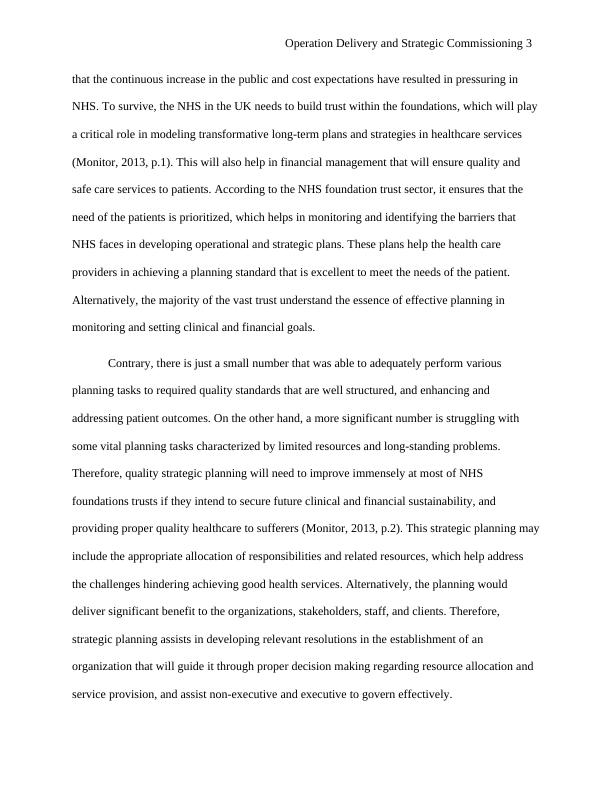
Operation Delivery and Strategic Commissioning 4
To effectively plan, NHS must have a vivid understanding of the trends in their local
health economies, and their future position and roles within them. In spite of this, they will need
to work with their respective commissioners to understand illness prevalence, potential and
existing demands for health services, and different commissioning intentions. Thus, this
analytical information regarding strategic planning, NHS trusts can determine which health
services they can best provide sustainably, and identify the most effective and efficient ways to
offer them. This will help in maximizing the productivity and quality of health care. Moreover,
the NHS foundation must work collectively with other providers in forming strategic networks,
which will help in delivering more integrated care across their health economies.
Roles of Strategic Management in NHS
Change Manager
According to Health Careers (n.d, p.2), the NHS foundation works in large acute trusts
and play a crucial role in transforming and shaping the future of the trusts. This would focus on
delivering benefits in various sectors, for instance, diagnostic imaging services, managers and
clinicians working together, and moving into providing non-clinical and clinical services to
multiple areas.
Commissioning Manager
This comprises several challenges that influence the role in primary health care provision,
and would give the commission-manager the opportunity to develop unique services for various
patients. It is vital to understand that this excludes planning of strategic health care services. In
spite of this, working with multiple services the commissioning managers are responsible for
ensuring that the various needs of the community are effectively and efficiently met. It is crucial
To effectively plan, NHS must have a vivid understanding of the trends in their local
health economies, and their future position and roles within them. In spite of this, they will need
to work with their respective commissioners to understand illness prevalence, potential and
existing demands for health services, and different commissioning intentions. Thus, this
analytical information regarding strategic planning, NHS trusts can determine which health
services they can best provide sustainably, and identify the most effective and efficient ways to
offer them. This will help in maximizing the productivity and quality of health care. Moreover,
the NHS foundation must work collectively with other providers in forming strategic networks,
which will help in delivering more integrated care across their health economies.
Roles of Strategic Management in NHS
Change Manager
According to Health Careers (n.d, p.2), the NHS foundation works in large acute trusts
and play a crucial role in transforming and shaping the future of the trusts. This would focus on
delivering benefits in various sectors, for instance, diagnostic imaging services, managers and
clinicians working together, and moving into providing non-clinical and clinical services to
multiple areas.
Commissioning Manager
This comprises several challenges that influence the role in primary health care provision,
and would give the commission-manager the opportunity to develop unique services for various
patients. It is vital to understand that this excludes planning of strategic health care services. In
spite of this, working with multiple services the commissioning managers are responsible for
ensuring that the various needs of the community are effectively and efficiently met. It is crucial
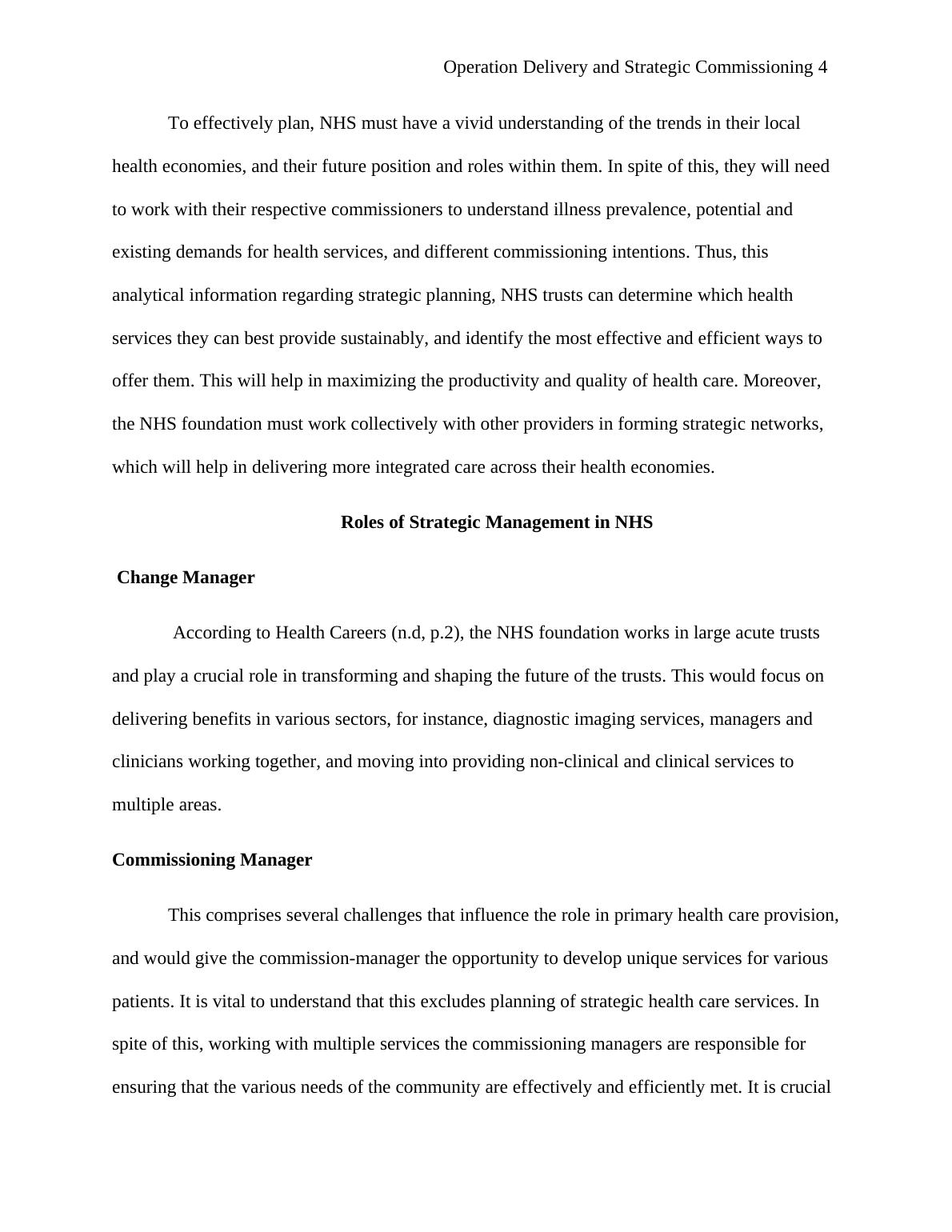
Operation Delivery and Strategic Commissioning 5
to note that development and commissioning of healthcare services vary for variety groups such
as asylum seekers, HM prison, ethnic and black communities, and development of smoking
cessation services (Health Careers, n.d, p.2).
Directors of Strategic Development
According to the mental health trust, executive directors play a crucial role in shaping the
future of social care provision and mental health services. Furthermore, the directors provide a
board that overviewing new developments in particular sectors such as adolescent and child
services, and regional forensic services to women (Health Careers, n.d, p.3).
General Manager
According to Health Careers (n.d, p.3), the general manager is a high profile directorate
within one of the UK’s largest mental health trusts. As such, he or she is responsible for the basic
NHS plans in reforming the assessment, management, and treatment of critical patients. In spite
of this, the general manager provides strategic professional and support guidance, while also
managing the capital invested in catering to the patients.
Models and Frameworks Influencing the Procurement and Commissioning of Services
NHS England (2014, p.2) assert that the guide provided by NHS assists commissioners of
healthcare services in transforming the provision of the services. As such, the guide explores
some evidence that will help in achieving an effective transformation of healthcare services. It
should be noted that the framework provided by NHS England consists of two sections. Firstly, it
describes seven main themes that identify the combination of emerging insight and evidence
scanning from the healthcare systems. Thus, the section recognizes the importance of the
commissioning process, which are mapped against the commissioning cycle. Secondly, the
to note that development and commissioning of healthcare services vary for variety groups such
as asylum seekers, HM prison, ethnic and black communities, and development of smoking
cessation services (Health Careers, n.d, p.2).
Directors of Strategic Development
According to the mental health trust, executive directors play a crucial role in shaping the
future of social care provision and mental health services. Furthermore, the directors provide a
board that overviewing new developments in particular sectors such as adolescent and child
services, and regional forensic services to women (Health Careers, n.d, p.3).
General Manager
According to Health Careers (n.d, p.3), the general manager is a high profile directorate
within one of the UK’s largest mental health trusts. As such, he or she is responsible for the basic
NHS plans in reforming the assessment, management, and treatment of critical patients. In spite
of this, the general manager provides strategic professional and support guidance, while also
managing the capital invested in catering to the patients.
Models and Frameworks Influencing the Procurement and Commissioning of Services
NHS England (2014, p.2) assert that the guide provided by NHS assists commissioners of
healthcare services in transforming the provision of the services. As such, the guide explores
some evidence that will help in achieving an effective transformation of healthcare services. It
should be noted that the framework provided by NHS England consists of two sections. Firstly, it
describes seven main themes that identify the combination of emerging insight and evidence
scanning from the healthcare systems. Thus, the section recognizes the importance of the
commissioning process, which are mapped against the commissioning cycle. Secondly, the
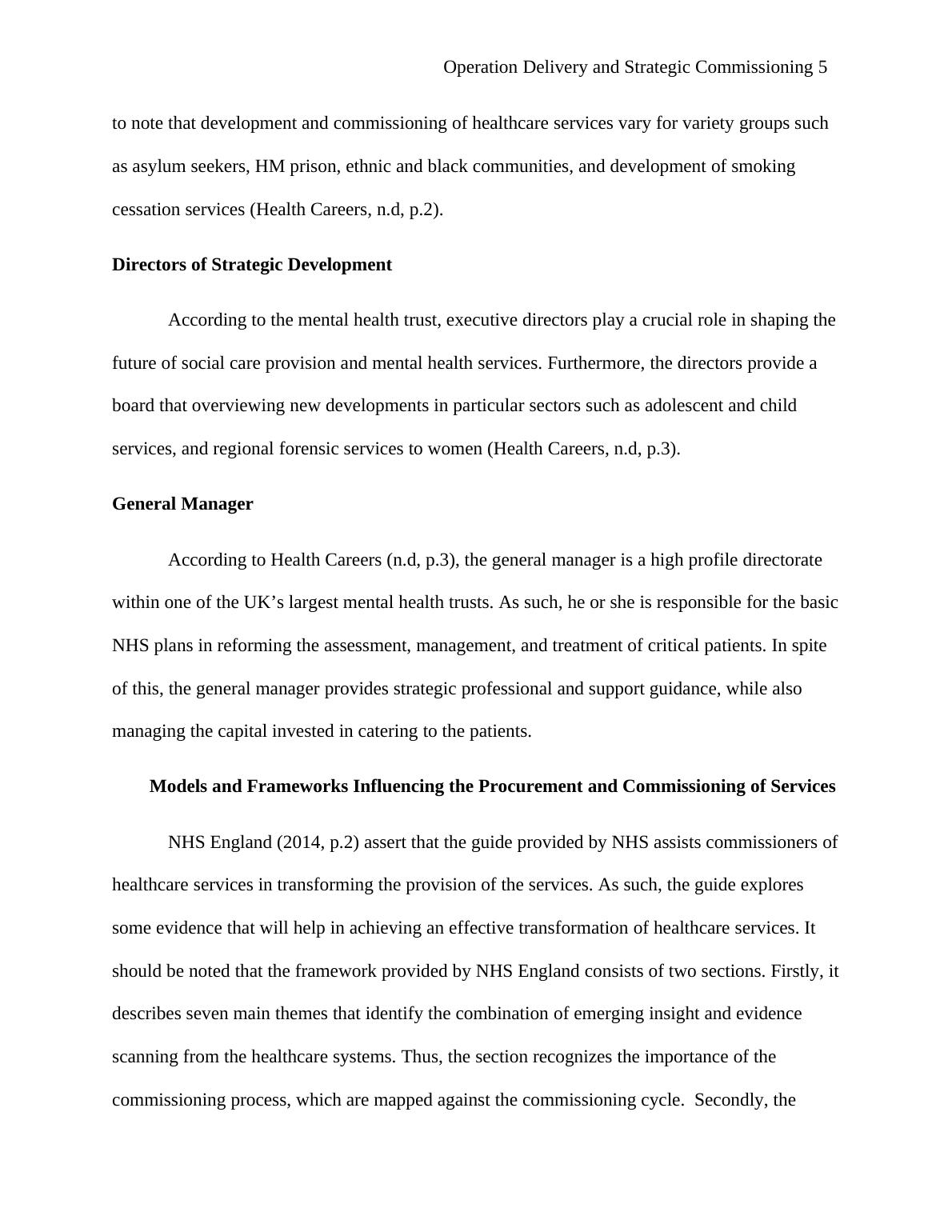
Operation Delivery and Strategic Commissioning 6
guide lists six considerations, which some commissioners are beginning to utilize when
approaching the transformation. As such, these are emerging ideas that indicate how some
sectors look forward to advancing their thought about commissioning service transformations.
Figure 1: Key themes identified from the approach of NHS England.
According to Dutton (2010, p.9), the IPC model connects the procurement and
commissioning cycle, and is relevant across most of the public care services such as education,
housing, health, and social care. Nevertheless, the model is based on four primary elements of
performance management; analyze, plan, do, and review. It further assumes that the elements
work in an orderly manner, which is all of equal importance; for example, contractors and
commissioners should set aside equal time, attention, and energy. Moreover, the commissioning
cycle should drive contracting and procurement activities, although the contracting and
purchasing experience should inform the ongoing creation of commissioning.
guide lists six considerations, which some commissioners are beginning to utilize when
approaching the transformation. As such, these are emerging ideas that indicate how some
sectors look forward to advancing their thought about commissioning service transformations.
Figure 1: Key themes identified from the approach of NHS England.
According to Dutton (2010, p.9), the IPC model connects the procurement and
commissioning cycle, and is relevant across most of the public care services such as education,
housing, health, and social care. Nevertheless, the model is based on four primary elements of
performance management; analyze, plan, do, and review. It further assumes that the elements
work in an orderly manner, which is all of equal importance; for example, contractors and
commissioners should set aside equal time, attention, and energy. Moreover, the commissioning
cycle should drive contracting and procurement activities, although the contracting and
purchasing experience should inform the ongoing creation of commissioning.
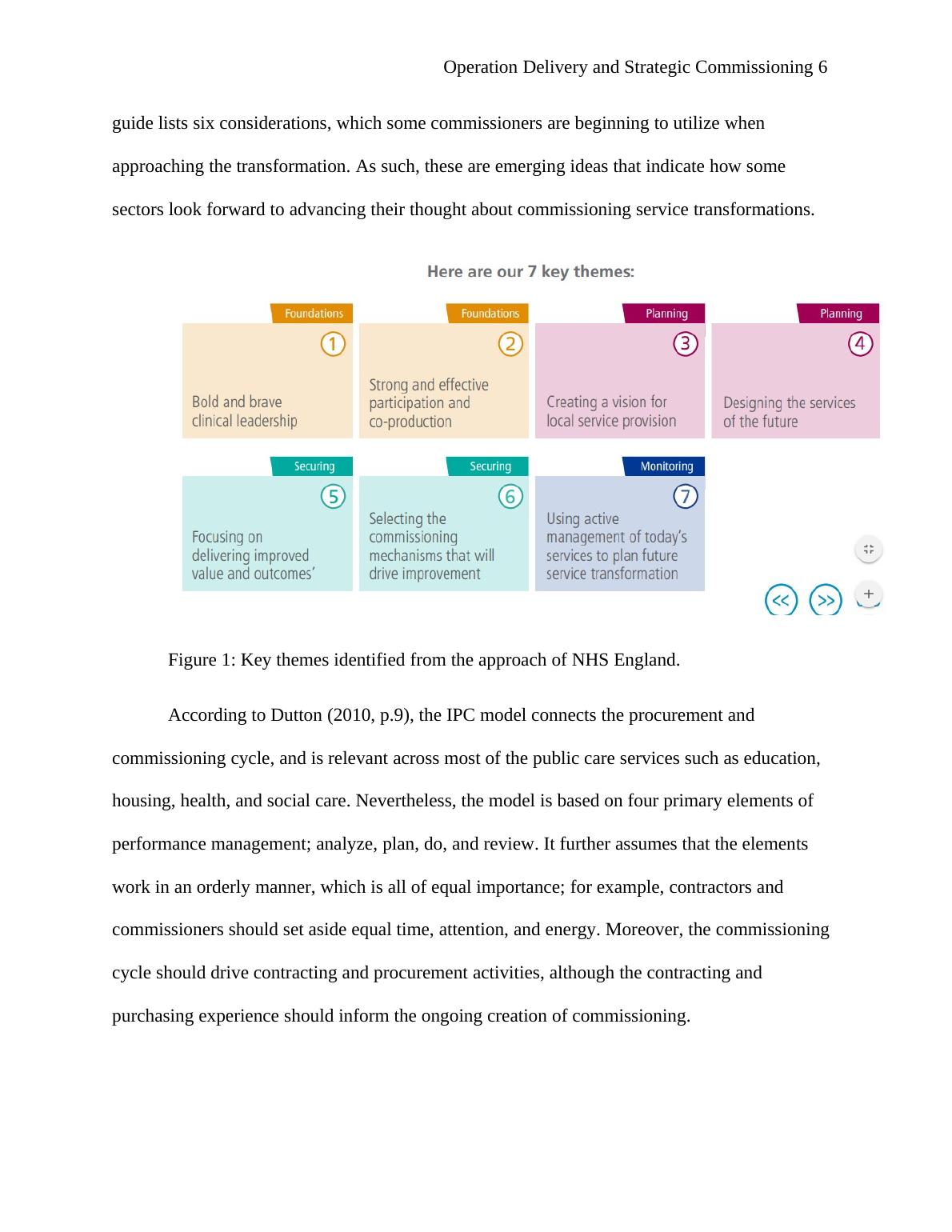
End of preview
Want to access all the pages? Upload your documents or become a member.
Related Documents
Operational Delivery and Strategic Commissioninglg...
|20
|5300
|67
Importance of Continuous Professional Development in Health and Social Carelg...
|13
|964
|454
Health Care Environment - Sample Assignmentlg...
|25
|6430
|173
Strategic and Commissioning in Health Care: A Contemporary Approachlg...
|22
|5885
|133
Health and social care servicelg...
|8
|1631
|55
SWOT Analysis of NHS: Improving Healthcare Serviceslg...
|14
|3901
|176
